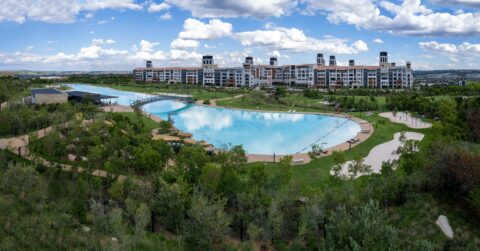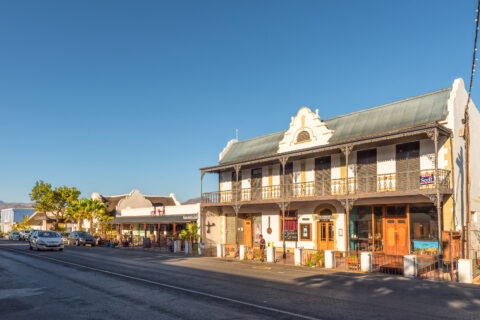Financial Mail Travel
Waking Beauty
It’s not called ‘Slaapstad’ without reason. And we all know the jokes – like the one claiming that the nickname ‘Mother City’ refers to the fact that it takes nine months to get anything done here. Johannesburg’s movers and shakers will tell you it’s a city where everyone’s snoozing. Where showing up for work at 8am typically means you’re early on the job, and skipping home at 3pm – or heading straight from the office to the beach – is par for the course. Even Capetonians admit it. Gleefully.
Yet, while it is true that Cape Town is predominantly a leisure destination and that most accolades bestowed on her have to do with her natural good looks and her ability to swoop tourists off their feet, there’s evidence that this Sleeping Beauty is waking up.
In a 2015 study conducted by the Brandeis International Business School in Massachusetts, Cape Town was named one of seven ‘new frontier’ cities poised for expansion in the areas of technology and life science – others were Be’er Sheva, Campinas, Chengdu, Istanbul, Kuala Lumpur and Santiago. Among other positive traits, the study identified an emerging start-up culture fostered by people attempting to transform Cape Town into something more than a pretty holiday resort.
Such efforts are bearing fruit. According to data innovation agency, 2thinknow, Cape Town ranks highest in Africa on the 2016–2017 Innovation City Index. And while it’s only 120th on a global scale, behind places such as Incheon, Tallahassee and Dresden, the real surprise is the edge Cape Town has on bigger regional contenders – including Jo’burg.
“Things do move slowly, it’s true,” says Patrick Schofield, CEO and founder of Thundafund, the country’s biggest crowdfunding platform, which launched in Cape Town five years ago. “Compared to London, Paris, Munich, and many cities in the US, it’s a flipping backwater.” But in the African context, he says, the city has seen significant growth as an innovation and start-up hub.
Schofield puts it down to a combination of factors, including a lot of support for entrepreneurship from local government. He reckons that, as an underdog, the Western Cape has “had to fight to prove itself”.
“Local government has tried to build infrastructure to enable tech innovation in the city,” says Boitumelo Menyatswe, ecosystem manager of Silicon Cape, a non-profit community of over 9 000 innovators, tech entrepreneurs, angel investors, venture capitalists and key digital economy players. “There’s a willingness to engage directly with anyone wanting to start something new.” Plus, she says, there’s a real ecosystem, a network of people able and willing to collaborate and share knowledge.
She says that in the 10 years since Silicon Cape was established, the city has demonstrated that a tech hub in Africa is possible. “Proven,” she says, “by businesses we’ve seen exiting at over $100 million.” Successes include digital publishing platform Snapplify, which – although London-based – was incubated by South Africans, and online education company GetSmarter, which last year sold to Nasdaq-listed 2U for a record-breaking R1,4 billion.
Major movement is afoot among younger operations, too. Fintech firm Jumo last year became the first South African start-up selected for Google’s Launchpad Accelerator, having grown from seven to 300 employees within two years.
“We’re probably the world leaders in our niche,” says Timothy Willis, marketing head at Aerobotics, a start-up that uses machine learning to turn drone and satellite images into insights for farmers. It was among 24 start-ups selected for Google’s fifth Launchpad Accelerator which began in January in San Francisco. The company, which launched in 2014 to build drones, last year pivoted into software and suddenly took off, with plans to grow from 20 to 60 full-time employees by the end of 2018.
Those employees, says Willis, “really love living in Cape Town because it has tons of activities not available in most cities.”
That sentiment – that the city’s lifestyle opportunities have an impact on how people are motivated in businesses – is widely shared. Schofield says it’s a fact that “if Jo’burg was as pleasant to live in as Cape Town, it would be steaming ahead.”
“But it’s not,” he argues, because – for those who choose Cape Town as a base – priorities are different. “People are prepared to pretty much slum it here while they get things together and out the door. When you’re in the start-up space, not earning that much and struggling a bit, it helps to live in a beautiful place.”
Schofield identifies two key moments in the last decade that have significantly impacted Cape Town’s viability as a business hub. One was Cape Town’s tenure as World Design Capital in 2014. “It got creative people excited, and those people supported a mass drive, a coming together of different communities that we are still feeling,” he says. But before that, it was the FIFA World Cup in 2010, which exposed the city to a lot of foreigners. “A lot of people who came for the soccer spent time in Cape Town and stayed behind.”
One Jo’burg-bred Cape Town-based entrepreneur who sings the city’s praises is Shaun Williams, who works at the V&A Waterfront’s Workshop17, a buzzing co-working space with great views through vast windows across the city towards Table Mountain. Gorgeous views aside, Williams says he’s noticed Cape Town “quickly becoming an alternative to the Silicon Valleys of the world.”
“I think this city has a big future, especially in the tech space,” he says, calling it “the biggest and best start-up city in Africa, with the ability to attract the biggest investors, and the best talent and infrastructure.”
Williams, who runs one business in the rapidly-evolving YouTube space, while looking after a start-up marketing agency, says that “the greatest added value of starting a business in Cape Town is the work-life balance and concomitant decrease in stress.” Plus, he says he’s “been struck by the relative ease of networking, particularly within the start-up and tech scenes.” Williams believes that fast-paced Jo’burg has yet to foster the same sense of community for young businesses.
Schofield adds that there’s a spirit of openness towards original ideas. “Cape Town is very open to people trying new stuff and people do not judge as much based on how much capital you have in the bank,” he says. “Jo’burg’s more about how much money has been made, so it’s a much harsher environment. In Cape Town, there’s space for wackier ideas to come through.”
There is more to it than a tolerance for crazy ideas, though. An added advantage is that it’s reckoned to be 54% cheaper to live here than in London. And while Capetonians complain bitterly about property prices, rentals are about 25% of those in San Francisco.
Lianne du Toit, who is business network director for global entrepreneurship organisation YPO, says many international entities are trying to find ties with the city. This, she says, has much to do with the city’s allure as a leisure destination. “A lot of people with money, ex-bankers and the like, come on holiday and then want to invest money here because they want to set up their lifestyle here.”
Consequently, plenty of organisations are building bridges in order to foster foreign investment. In April, France’s start-up movement La French Tech launched a Cape Town hub.
Du Toit says that while the lifestyle is often the drawcard, the city has other advantages linked to entrepreneurship’s driving ethos. “I feel like things – such as our amazing food culture – start here quicker; they happen here first, and then travel to other parts of the country.”
Du Toit emphasises that entrepreneurship isn’t restricted to the city’s privileged enclaves, either. She says the city’s unique economic dichotomy is being addressed by start-up incubators set up in disadvantaged communities. “The city is full of very intimate, personal stories of innovation. Here, an entrepreneur is also the man who, upon realising that his grandmother couldn’t access her prescription medicines, developed a delivery bike service to distribute medication to people in townships.”
“We’re dealing with the very real hard realities of a very unequal society,” says Schofield, who believes Cape Town’s peculiar set of challenges has fostered resilience. “This city is not vanilla. As much as it’s open to letting new things happen, it’s also gritty. It’s hard. For hundreds of years, this was called ‘The Cape of Storms’, and it’s exactly that. But when you’re in an environment that has storms, the result is change.”
For entrepreneurs and future business leaders willing to weather the storm, it may just be worth putting up with the good life – even if the wait for success stretches well beyond nine months.






 Sign-up and receive the Business Media MAGS newsletter OR SA Mining newsletter straight to your inbox.
Sign-up and receive the Business Media MAGS newsletter OR SA Mining newsletter straight to your inbox.